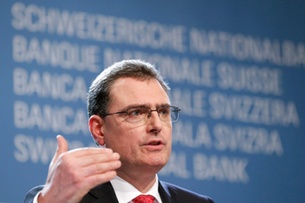The strong franc is hurting Swiss exporters and the domestic tourism industry The continued volatility surrounding the Italian elections and the threat of global trade wars make it far too early for the Swiss National Bank (SNB) to consider raising rock bottom interest rates, says chairman Thomas Jordan. “It’s much too early at this moment,” Jordan told CNNMoney Switzerland. “The situation is still quite fragile regarding [currency] exchange rates. This is the reason that we continue our monetary policy of negative interest rates.” Most analysts expect the three-month Libor band to remain unchanged at between -1.25% and -0.25% for at least the rest of this year. Jordan’s comments on Friday added further fuel to the
Topics:
Swissinfo considers the following as important: 1) SNB and CHF, Business, Featured, newsletter, Thomas Jordan
This could be interesting, too:
Nachrichten Ticker - www.finanzen.ch writes Die Performance der Kryptowährungen in KW 9: Das hat sich bei Bitcoin, Ether & Co. getan
Nachrichten Ticker - www.finanzen.ch writes Wer verbirgt sich hinter der Ethereum-Technologie?
Martin Hartmann writes Eine Analyse nach den Lehren von Milton Friedman
Marc Chandler writes March 2025 Monthly
The continued volatility surrounding the Italian elections and the threat of global trade wars make it far too early for the Swiss National Bank (SNB) to consider raising rock bottom interest rates, says chairman Thomas Jordan.
“It’s much too early at this moment,” Jordan told CNNMoney Switzerland. “The situation is still quite fragile regarding [currency] exchange rates. This is the reason that we continue our monetary policy of negative interest rates.”
Most analysts expect the three-month Libor band to remain unchanged at between -1.25% and -0.25% for at least the rest of this year. Jordan’s comments on Friday added further fuel to the general forecast that the SNB will bide its time before lifting rates into positive territory.
Having briefly peaked at CHF1.20 ($1.22) in April, the Swiss franc-euro exchange rate has since dropped to CHF1.156, largely due to the political turmoil in Italy. A ruling coalition has only been established in the last few days, despite elections being held in March.
Unstable European outlook
The anti-establishment coalition had previously flirted with the idea of pulling Italy out of the eurozone, but Jordan told CNNMoney Switzerland that he considered this move to be now “very, very unlikely”.
However, the Italian political turbulence has played havoc with both currency exchange rates and stock markets. Speaking at a business conference in Zurich at the end of last month, UBS chairman Axel Weber said the outlook in Europe remained unstable.
“It would be considered a success if Europe remains as integrated in five years’ time as it is today and can show the same high economic growth,” said Weber, who has previously headed Germany’s central bank. Weber also rejected the idea of Italy abandoning the euro, but fears that its economic turbulence could infect other European countries, such as Greece, Spain and Portugal.
Weber added his view that it was possible for the SNB to keep negative interest rates throughout 2019. “The Swiss National Bank will probably maintain a wait-and-see position for another two years,” he said.
Exporters fret
Italy is also a worry for Swiss manufacturers that export the majority of their goods to the eurozone. In an interview with AWP, Hans Hess, head of the industrial lobby group Swissmem said the threat of an Italian state bankruptcy and a weakening euro are top of his worry lists.
“This risk is considerable, and I believe it is the greatest for our industry,” he said. “If international investors were to lose confidence in the euro because of developments in Italy and the euro weakened sharply against the Swiss franc, this would hit our industry hard.”
In the meantime, the Swiss economy is showing signs of steady growth at around 2% so far this year. Economists at BAK Basel on Thursday forecast a 2.3% growth in gross domestic product for 2018. The unemployment rate fell to 2.4% last month, the lowest figures since the financial crisis a decade ago.
Tags: Business,Featured,newsletter,Thomas Jordan

